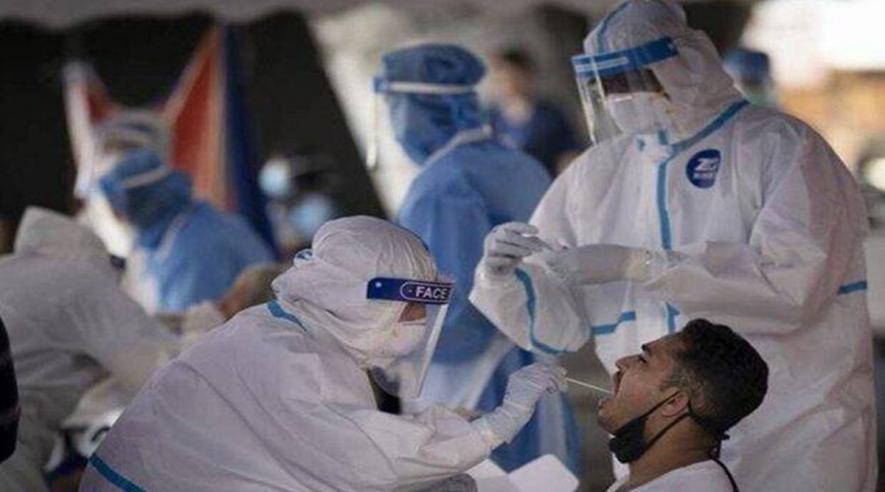Respond to COVID-19 Based on Evidence, Avoid 2021 Mistakes: Experts Write to Centre, States

Image Courtesy: The Financial Express
With the country in the grip of a severe third COVID-19 wave and the number of Omicron cases increasing to 5,753, around three dozen healthcare workers, medical researchers and public health experts have appealed to the Central and state governments to avoid repeating the 2021 response mistakes, and stop “unwarranted” medications, tests and hospitalisation.
India reported 2,64,202 new infections and 315 deaths in the last 24 hours with the daily positivity rate at 14.78%, the ministry of health and family welfare said on Friday.
Calling for reliance on “high-quality scientific literature that provides unequivocal guidance on the clinical management of COVID-19”, the experts argued that “unwarranted” medications, tests and hospitalisation are based on “limited evidence” and “misinformation”.
Two of the five measures proposed by the experts, according to The Wire, include updating the June 2021 Directorate General of Health Services (DGHS) guidelines based on scientific evidence and publishing “homecare guidelines for rapid testing, quarantining, isolation and release in all local languages”.
Despite the response to the pandemic last year being “riddled with missteps—several of which were avoidable—there continues to be much uncertainty amidst the outbreak of this novel disease”, the signatories wrote. The Centre and the states should now rely on available “substantive high-quality scientific literature” that “provides unequivocal guidance on the clinical management of COVID-19”.
Urging the governments to stop the use of medications and diagnostics inappropriate for the clinical management of the virus, the experts termed the prescribing of vitamin combinations, azithromycin, doxycycline, hydroxychloroquine, favipiravir and ivermectin “irrational”.
“The vast majority of patients with COVID-19, with asymptomatic and mild symptoms, will require little-to-no medications. Most prescriptions we have reviewed in the past two weeks include several COVID-19 kits and cocktails. Such wanton use of drugs is not without harm as the Delta wave has shown,” they wrote. The outbreaks of “opportunistic fungal infections like mucormycosis in India and aspergillosis in Brazil were attributed to the widespread abuse of inappropriate medications”, they added.
The experts also mention how affected families are being financially burdened with doctors prescribing “CT scans and a battery of laboratory tests like d-dimer and IL-6” in asymptomatic and mild cases despite the initial positive rapid antigen or PCR test and home monitoring of oxygen level being sufficient except in some cases.
Based on growing scientific evidence, the signatories also stressed how Omicron might cause “many breakthrough cases among previously infected or previously vaccinated populations” but the morbidity and mortality among them will be “lower”.
Admitting patients “without clinical justification” not only adds to the financial load but also “risks” the lives of hundreds of thousands of other non-COVID-19 patients who “cannot find a hospital bed for more emergent conditions”, the experts wrote.
Appealing to the state agencies and professional medical societies to end “these unwarranted practices” and calling for changing government guidelines that have “unfortunately promoted expensive diagnostics and medications with limited evidence”, the experts requested the Centre to update “the evidence-based June 2021 DGHS guidelines and “provide specific guidance on the use of monoclonal antibodies given their limited efficacy for the Omicron variant and their continued widespread use”.
The government should also educate the public education, the experts wrote, and “provide professional training” to discourage the use of medications that have no supporting evidence for the treatment of COVID-19, including alternative therapies, potions, antibiotics, cocktails, and drugs like Molnupiravir, which are expected to be widely abused and inappropriately prescribed”.
Similarly, the government should “discourage the use of unwarranted diagnostics, especially for asymptomatic and mild cases, where none are required, except for confirmatory Antigen or PCR tests”.
Requesting the Centre and the states to publish homecare guidelines for rapid testing, quarantining, isolation and release in local languages, the experts said that they should be “contextually modified to suit local urban and rural contexts where the availability of rapid antigen home tests and PCR tests varies widely” and include a list of vetted local resources, including helpline numbers.
Both the Centre and the states should stop any state-sponsored promotion or distribution of medications, cocktails, alternative therapies or potions that are not scientifically proven therapies, the experts further suggested.
Underscoring the importance of “ramping up proven effective public health strategies”, including universal masking at all public places, the signatories requested the Centre and the states to “provide communities resources to do so through mass media campaigns and the regular distribution of appropriate three-ply masks. All healthcare workers should be provided adequate N95s and eye protection and the governments should “continue to accelerate vaccination, building on current success”.
Get the latest reports & analysis with people's perspective on Protests, movements & deep analytical videos, discussions of the current affairs in your Telegram app. Subscribe to NewsClick's Telegram channel & get Real-Time updates on stories, as they get published on our website.
























